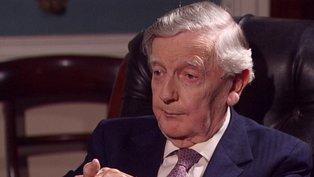Costello and FitzGerald compared

Vincent Browne traces the different trajectories of two Fine Gael figures who have died within weeks of each other
Declan Costello and Garret FitzGerald were very different. This was even though both were Fine Gael, the fathers of both were Fine Gael, both were perceived as being on the liberal wing of Fine Gael in the 1960s, both were very much of the well-off Dublin middle class, both were born in 1926, both died aged 85 within weeks of each other.
Declan was reserved, shy and almost reclusive. Garret not at all reserved, very sociable, not at all shy. Garret was ambitious in a way Declan never was, although Declan did want to be leader of Fine Gael and, inevitably, did want to be taoiseach like his father. But for Declan, leadership would have been a chore to be endured. Garret loved it.
I don’t know if they were very close – I suspect not, for their personalities would not have gelled. Also their politics differed considerably, although this may never have materialised in an outright disagreement.
Declan was elected to the Dáil in 1951 and was a backbench Fine Gael TD in the second coalition government led by his father, John Costello, from 1954 to 1957. Along with his brother-in-law Alexis FitzGerald (later senator and adviser in cabinet in Garret’s first government in 1981), Declan was involved in the publication of a Fine Gael newspaper, the National Observer , in the late 1950s – the only evidence of intellectual life in Fine Gael at the time.
From 1959 to 1964, Declan sought to push a radical policy line on Fine Gael, under the then leadership of the Edwardian figure of James Dillon, arguing there was no raison d’être for Fine Gael as it was, for it merely echoed the then policies of the Lemass-led Fianna Fáil. Dillon repeatedly batted off Declan’s initiatives until 1964 when Declan drafted the outlines of the Just Society document, which declared at its outset that the purpose of politics was to make a reality of two concepts – justice and equality. Garret never bought into the equality thing.
Fine Gael was not interested in policy and certainly not interested in equality in any substantive sense. However, the intervention of a Fine Gael former minister and attorney general, Paddy McGilligan, forced a reassessment in the teeth of opposition from the most commanding figure in the party at the time, Gerard Sweetman.
His politics, from today’s perspective, would be perceived as far-left. He argued for the intrusive intervention of the State in the management and planning of the economy, involving control of the banks and an incomes policy. He favoured the redistribution of wealth to end poverty and attack inequality.
He displayed a determination in forcing through a radical manifesto for the 1965 general election in opposition to a majority on the Fine Gael front bench. It represented a coup within the party but, ultimately, a doomed one. For Fine Gael could never be a credible left-wing party, and James Dillon underlined that when, introducing the Just Society manifesto in the 1965 election campaign, he stated “Fine Gael is the party of private enterprise.”
Declan, whose health was always suspect, was so worn out by the labours of the party in-fighting from 1959 to 1965 that when he was sidelined in the leadership change after the 1965 general election he gave up. Dillon resigned abruptly and orchestrated his immediate replacement by Liam Cosgrave. Those who wrote then and subsequently that Declan was not interested in the leadership of Fine Gael were mistaken. He wanted it.
He was friendly with Garret during the early 1960s and anyway they would have known each other from UCD. They lived beside each other at the time, Garret on Eglinton Road in Dublin 4 and Declan around the corner on Clonskeagh Road.
But Garret, unlike Declan, was taken by the Lemass-Whitaker strategy of an economic programme, of which Declan was very critical. Nevertheless, Garret did some work behind the scenes in 1964 and early 1965 on the Just Society document – he drafted an industrial policy which actually never made it into the final document.
Garret told Declan of his decision to enter politics over lunch at the Unicorn restaurant, but Declan was discouraging – this was in 1964. Declan argued that Garret should await the outcome of the internal Fine Gael debate on his Just Society proposals. Garret agreed to delay his decision and held off for over a year.
Declan announced in 1967 or 1968 he was leaving politics and he did not stand in the 1969 election. He was coaxed back for the 1973 election. He expected to be and wanted to be a minister but was offered the position of attorney general instead. He was great in that role but felt sidelined. He opted for the High Court in 1976 and was an outstanding judge.
For many of us who were enthusiastic members of Fine Gael in the mid-1960s because of his document, he was iconic. I got to know him then and, over the years, retained a distant contact.
We had lunch about two years ago and he was then as energised by the ideal of social justice as he had been 45 years previously. He had a miserable end to his life over the last 18 months.
I know of few people who deserved that less. He was a fine man.
